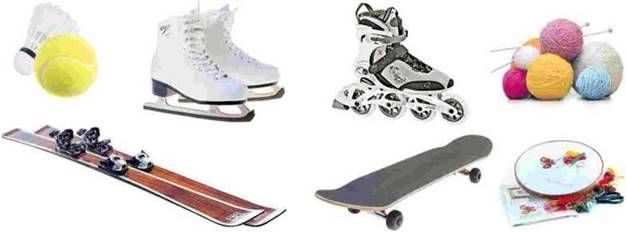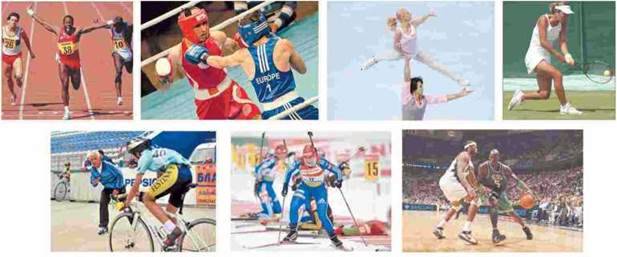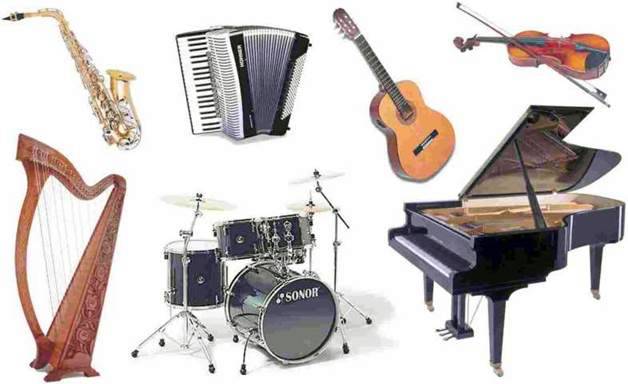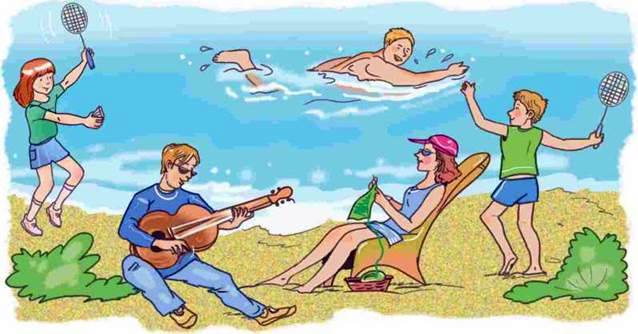May Success Attend You!
Unit Two: On Your Hobby Horse
2.1. May Success Attend You!
Word Bank | Phrase Bank | Communication Box |
To interview somebody To hit thrilling speed To take off to land | To take a walk in nature To do a lot of squash To keep fit To make a model To practise something at leisure To fly model aircraft To take somebody away from Home | …that sort of thing. It depends. … at least Actually, … May success attend you. …in the long run…by any chance. The world we live in! |
I. Conversation Warm-up.
Look and say what hobbies you do most and which you would like to try.

Dancing painting drama
Example: I do dancing
II. Pronunciation Warm-up.
Read the poem and practise the sounds /і:/, /гу/. Say how you use your imagination.
IMAGINATION POEM
Just sit there, try and think
(you don’t even have to blink).
Use your mind,
And oh!
A lot of things you will know,
When you use imagination
You’ll enjoy each new creation,
Try it once, and you’ll agree
The world can offer much to see.
III. Grammar Smart.
1. Look and recall.
A) Use different adjectives if you want to describe your hobbies. To sound positive, add:
Wonder – wonderful fame – famous love – lovely
Add – able/-ing/-ive to the verbs:
Example: to enjoy – enjoyable
To relax – relaxing
To impress – impressive
B) To sound negative, add – less to the nouns:
Example: use – useless
Fruit – fruitless
A) Play a grammar word-formation game. Use the nouns from the box below.
Example: Ann: beauty
Steve:
Beauty | To enjoy | Love | Wonder |
To excite | Cheer | Use | To interest |
Colour | To relax | Danger |
B) Ask your friends:
1. What hobby is interesting to practise;
2. What she/he finds enjoyable;
3. What hobbies can be dangerous or useless;
4. Who has an impressive hobby.
2. Read and remember!
A) Use as + adjective + as if you want to say that two hobbies have the same quality.
Example: Dancing is as exciting as drama.
B) Use not as + adjective + as if you want to describe a difference.
Example: Dancing isn’t as exciting as drama.
C) Use not nearly as + adjective + as if you want to stress a big difference.
Example: Dancing isn’t nearly as exciting as drama. (= Drama is much more exciting.)
D) Use almost as + adjective + as if you want to stress a small difference.
Example: Dancing is almost as exciting as drama.
A) Play a grammar comparison game. Use the pictures and the adjectives.
Example: Ann: Badminton or tennis?
Steve: Badminton isn’t as spectacular as tennis.

Spectacular dangerous hard breathtaking enjoyable
B) Tell your friend about your hobbies as in the example.
Example: I have two hobbies: collecting stamps and chess playing.
Collecting stamps is as interesting as chess playing. But it isn’t nearly as difficult as chess playing.
IV. Word Smart.
1. Study the words (p. 40-41) and speak about: a) sports as a hobby;

Football | Cycling | Volleyball | Jogging | Basketball |
Swimming | Tennis | Skating | Badminton | Skiing |
Example: Many people do sports as a hobby. I like to play football and go cycling.
B) crafts as a hobby;

To make models, to knit, to embroider, to sew, to fix something
Example: I have joined a DIY club where we make model kites, aeroplanes, helicopters ourselves.
E) music as a hobby.

To listen to music
To play a musical instrument
To sing
The piano
The violin
The guitar
To join the choir
To go to / to perform at a concert
The clarinet
The flute
Example: My hobby is music. I can play the piano and I often perform at concerts.
2. Look at the photo and say what different family members enjoy doing at leisure.
Example: I think the mother enjoys knitting at leisure.

At home: Make a list of hobbies in your family and compare them using (not) as… as… .
Go to Ex. 21, 22 of your Workbook
V. Time to Listen and Read.
1. Listen to / read the talk between Lucy and Paul about their hobbies and say why they enjoy them a lot.
TALKING ABOUT HOBBIES
Paul and Lucy have just met near the leisure centre. They are going to participate in the local festival “On My Hobby Horse”. A journalist is interviewing them about their hobbies for the children’s magazine.
First, Lucy.
PART I
Journalist: Hi, Lucy, what sort of interests do you have? What do you do in your free time?
Lucy: Well, I love to take long walks in nature, and I do a lot of squash.
Journalist: What do you enjoy most about those activities?
Lucy: I love being out in the open, to enjoy the beauty of nature and listen to the country sound – birds twittering, frogs croaking, wind hitting my face, that sort of thing. It’s so relaxing, you know. As for squash, it is a very fast game. I play it in an indoor court as a way of keeping fit. It gives such a thrilling sense of speed and energy. After a hard day at school, it helps me to become myself again.
Journalist: And how much time do you spend on your hobbies?
Lucy: It depends. I try to get at least one hour of walking every day and do squash twice a week.
Journalist: Oh, my! That’s great. You must really keep fit.
Now, Paul.
PART II
Journalist: Hi, Paul. What activities do you practise at leisure?
Paul: I’m very much interested in flying model aircraft. I have joined a DIY club where we make model kites, aeroplanes, helicopters ourselves. It’s a hobby which takes us away from home, especially at weekends when we go out of town to fly our models into the air. It is so exciting!
Journalist: And how long have you had this hobby?
Paul: Well, let me think… It all started with my first flight. It was about three years ago when my family and I were going to England by plane. We took off in Kyiv and landed in Birmingham three hours later. It was the wonder of wonders – seeing the world from above! Actually, that brought me to making models, in the long run.
Journalist: The world we live in! Have you, by any chance, invented a flying machine of your own?
Paul: Not yet, but I’m working on it.
Journalist: May success attend you!
Paul: Thank you.
BrE centre
AmE center
See First Aid Kit,
Word Spelling, p. 216
Across Culture: Great Britain
Birmingham – Бірмінгем, друге за розміром місто в Англії.

2. Answer the questions.
1. What do the children do in their free time?
2. Why do they enjoy their leisure activities?
3. How much time do they spend on their hobbies?
4. Who has a more exciting hobby?
5. Have you ever tried to practise any of the children’s hobbies?
3. Complete the sentences about the children’s hobbies and compare them to yours.
Example: Lucy loves… . -” Lucy loves being out in the open. Me too.
1. Lucy tries to get….
2. After a hard day at school, ….
3. Paul is very much interested in… .
4. It’s a hobby which….
5. Actually, … .
VI. Time to Communicate.
A) In pairs, talk about your hobbies, using the pattern:
Pattern:
A: Hi, … , what sort of interests do you have? What… in your free time?
B: Well, I have to…and I do… .
A: What do you enjoy most about…?
B: …. It’s so… , you know. It gives….
A: And how long do you spend on… ?
B: It depends. I try… , at least.
A: Oh my, that’s great! You must really… .
B: Sure. I.. .
B) Act as Lucy and say what you do at leisure. Use the picture and the word list.

To do a lot of squash; to take long walks in nature;
Relaxing out in the open
A) ct as Paul and tell the journalist about your hobby. Use the picture and the word list (p. 43-44).
DIY club;
Model kite;
To fly;
To take somebody away from home.
VII. Time to Listen.
Listen to the story about Ally’s hobby and say what she disliked about her new role and why.
VIII. Time to Write.
Write about your hobby. Begin with:
I have a head for…
I love…
It is so…
As for…, it’s a hobby which…
It all started with…
I have joined…
Actually, …
It gives such a…
It helps me…
I try to…
I Go to Ex. 23, 24 of your Workbook
